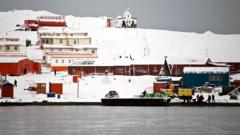Pope Leo XIV has applauded a recent treaty enabling Mauritius to regain sovereignty over the Chagos Islands from the UK, marking a significant moment in the rights of displaced Chagossians.
Pope Celebrates UK Agreement to Transfer Chagos Islands to Mauritius

Pope Celebrates UK Agreement to Transfer Chagos Islands to Mauritius
The Pope hails a critical milestone in the Chagossian struggle for justice as the UK agrees to transfer the islands to Mauritius while permitting US and UK military operations.
The Pope met with representatives of the Chagos Refugees Group in Vatican City, expressing his delight over the UK’s agreement to hand over the islands, a move he described as a "significant victory" in their long-standing quest to rectify a historical injustice. The formal agreement, signed in May, allows Mauritius to take control of the islands but stipulates that the US and UK military can maintain their presence on Diego Garcia for an initial period of 99 years.
In his speech delivered in French, the Pope emphasized the importance of respecting the identities and rights of all people, especially the right to return to their homeland. Eager for this new opportunity, the Pope hopes the Mauritian authorities will prioritize the return of the Chagossian refugees, who were forcibly displaced when the UK purchased the islands for £3 million in 1968. The UK government argued it was imperative to secure national security amid tensions with China by solidifying military presence in the region.
However, not all responses have been positive. UK opposition leaders, including members of the Labour Party, have labeled the deal as detrimental to national interests, expressing concerns that it exposes the UK to increased geopolitical risks. Critics point out that while Mauritius rejoices at the near-end of a 60-year struggle for recognition, prominent advocates within the Chagossian community still face uncertainties regarding their futures.
The agreement dictates a 24-mile exclusion zone around Diego Garcia, ensuring no construction occurs without UK authorization. Despite initial legal challenges raised by women seeking the right to return to Diego Garcia, the High Court ultimately dismissed these appeals. As the treaty awaits final approval from both UK and Mauritian parliaments, the complexities of historical grievances, international alliances, and national security continue to shape discourse surrounding the Chagos Islands.
In his speech delivered in French, the Pope emphasized the importance of respecting the identities and rights of all people, especially the right to return to their homeland. Eager for this new opportunity, the Pope hopes the Mauritian authorities will prioritize the return of the Chagossian refugees, who were forcibly displaced when the UK purchased the islands for £3 million in 1968. The UK government argued it was imperative to secure national security amid tensions with China by solidifying military presence in the region.
However, not all responses have been positive. UK opposition leaders, including members of the Labour Party, have labeled the deal as detrimental to national interests, expressing concerns that it exposes the UK to increased geopolitical risks. Critics point out that while Mauritius rejoices at the near-end of a 60-year struggle for recognition, prominent advocates within the Chagossian community still face uncertainties regarding their futures.
The agreement dictates a 24-mile exclusion zone around Diego Garcia, ensuring no construction occurs without UK authorization. Despite initial legal challenges raised by women seeking the right to return to Diego Garcia, the High Court ultimately dismissed these appeals. As the treaty awaits final approval from both UK and Mauritian parliaments, the complexities of historical grievances, international alliances, and national security continue to shape discourse surrounding the Chagos Islands.





















